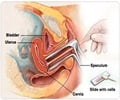Whether there are cancer screening inequalities among people of Muslim faith and culture is being examined by researchers.

‘The role of religion in health behaviors such as cancer screening is not only an important family medicine research question, but is also worthy of exploration in studies of a larger scale.’





Previous studies by Dr. Lofters have shown low breast and cervical cancer screening rates among immigrant women, with South Asian and Middle Eastern women being least likely to be up-to-date on cervical cancer screening and South Asian women being least likely to be up-to-date on breast cancer screening.Islam is widely practiced in both South Asia and the Middle East and according to the study, it is possible that religion may play a role in screening inequalities.
"In Canada we tend not to collect variables like race and religion, but one of the issues with not collecting it is we're not able to identify where there are gaps, concerns, or disparities," said Dr. Lofters, a family physician with the St. Michael's Academic Family Health Team. "Being able to track things like religion can be important for us when we're trying to figure out how to improve the quality of care that we provide for people."
The study used a voluntary survey combined with a retrospective review of the screening history of 5,311 patients of St. Michael's primary care practice.
Of the people surveyed, Muslim women were most likely to be up-to-date on breast cancer screening. Both Muslim women and women who self-identified with other religions were more likely to be up-to-date on breast cancer screening than those with no religious affiliation (85.2% vs. 77.5% vs. 69.5% respectively).
Advertisement
"We don't know why that is. Is there something about having a religious belief that makes you maybe more conscientious about your health?" said Dr. Lofters. "It's intriguing and it could be an avenue for determining how to encourage cancer screenings."
Advertisement
"We don't look much at the role religion could play in health behaviors like cancer screening, but we probably should," said Dr. Lofters. "At least to explore if there are differences, and if there are specific groups that we should be targeting."
Source-Eurekalert










